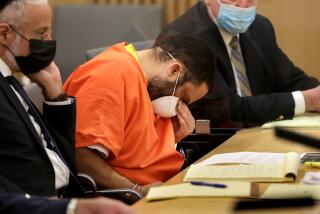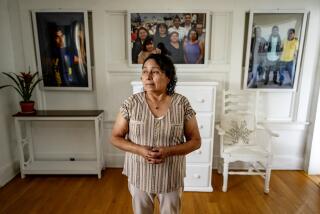Yorba Linda Teen Sentenced to Youth Facility in Mom’s Death
- Share via
ORANGE — Fifteen-year-old Danny Connolly will likely spend the next decade at the California Youth Authority under a sentence imposed Friday, after the Yorba Linda youth pleaded guilty to fatally shooting his mother in the back after a fight over cookies.
Superior Court Judge Frank F. Fasel’s decision wrapped up a case that gained widespread attention because Connolly, a Little Leaguer with no criminal record, had faced the possibility of state prison under a new state law that allows suspects as young as 14 to be tried as adults. The law is aimed at curbing violence and street crime by juveniles.
After a hearing last month, Fasel ruled that Connolly would be tried in Juvenile Court because he has no prior history of violence and can likely be rehabilitated at a youth facility. The judge also cited the boy’s show of remorse as a reason for his decision.
“There is punishment, and there is a chance for rehabilitation at the California Youth Authority,” the judge said during Friday’s sentencing.
*
Although Fasel ordered Connolly to serve 35 years to life behind bars for committing murder--a sentence enhanced because he used a firearm--the Youth Authority rarely holds inmates beyond age 25, unless they are determined to be dangerous to the public at that time. There is also a “remote” possibility that Connolly could be released prior to the age of 25, said Michael Giannini, his attorney.
Phil Connolly, the teen’s father, appeared relaxed and managed a smile for his son as almost a dozen friends and relatives expressed relief that the case was closed.
“He still has got a tremendous challenge awaiting,” said the father, who recently went to Sacramento with his 10-year-old daughter, Caitlen, to testify against proposed bills that seek to limit the authority of judges to decide which cases should remain in Juvenile Court.
At the state Capitol, Connolly recounted his family’s experience and spoke about the importance of giving children a second chance in life.
“I’m thankful that Danny got a second chance. This is his second chance,” Connolly said after Friday’s sentencing. “The possibilities are up to him now.”
Danny Connolly, who had been grounded for months prior to the death of his mother, came home from school on the afternoon of Feb. 22 and emptied a .22-caliber handgun at 42-year-old Cindy Connolly, hitting her four times. The shooting happened minutes after a fight over a half-dozen missing chocolate chip cookies, attorneys said.
*
Prosecutor Dan McNerney said during the previous hearing that Connolly had planned the killing, telling his friends about it and fashioning a silencer from a plastic bottle in an effort to prevent neighbors from hearing the shots.
McNerney argued that Connolly should be tried in adult court because of the heinous nature of the crime. Since the boy’s rage could not be explained by any psychological illness or history of parental abuse, efforts at rehabilitation are “educated guesswork,” McNerney said at the time.
Attorneys and activists who disagree with the year-old state law, which lowered to 14 the minimum age for trying people as adults, have hailed the decision. But they added that other 14-year-olds should get the same chance given to Connolly, who came from a middle-class, suburban neighborhood.
Juveniles who are convicted as adults may serve part of their sentences at the California Youth Authority. But once they turn 25, they must complete their sentences in state prison. Their records cannot be sealed, as they are in Juvenile Court.
Connolly is scheduled to be transferred to the youth facility in Norwalk within 10 days, said Giannini, his attorney. A former Esperanza High School student, Connolly told his father that he has ambitions of “writing a book to help other kids” deal with tensions that arise between parents and their children. The teen also is composing poetry for his family as a way to cope with his mother’s death, relatives said.
“The legal trauma is over,” Giannini said. “Now comes the familial healing of the tragedy.”
More to Read
Sign up for Essential California
The most important California stories and recommendations in your inbox every morning.
You may occasionally receive promotional content from the Los Angeles Times.













